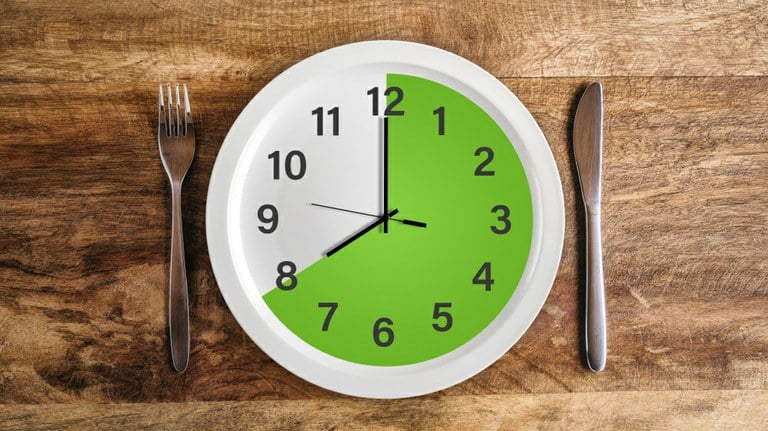My Cardiologist's diet plan for me is a daily 18:6 intermittent fast
| filed under: Fasting, Zero App, 18:6 IF, 18:6 Intermittent Fasting, Cardiology, Heart Failure, Intermittent Fast, Keto, Health, Weight Loss, Fitness, Ketosis, 18:6 Intermittent Fast, Heart Disease, Obesity, Intermittent FastingWhile it was a pretty casual, positive, interaction, my cardiology team at Virginia Hospital Center Cardiology Center, led by Dr. Matthew Lucks, has given me a path towards losing a ton of weight.
tl:dr:It’s pretty simple and seems to be a variation of an 18:6 intermittent fasting (IF) regimen:
-
Wake up
-
Drink a warm glass of lemon water down
-
Have a cup of coffee
-
Don’t eat anything until noon
-
I can eat from noon until 7 PM (my window)
-
(My schedule works better with a 12:00-18:00 window)
-
Eat at noon and then before 6 PM
-
Focus on lean proteins, fiber, and veggies
-
Replace white rice with brown rice
-
Don’t just eat green salads, add chicken, etc
-
Don’t drink coffee after 15:00 (3 PM)
-
Don’t consume anything after 18:00 or before noon the next day
-
Go to sleep at or before 9 PM
-
Lots of walking, exercise, movement, etc.
Context: I had a very good physical check-up from my cardiologist, Matthew Lucks, MD, FACC, which was brilliant. Sinus Rythm instead of afib, pulse in the high 50s instead of the high 80s, and the EKG looked good. Nothing left to address except the literal elephant in the room: my body weight. I’ll admit to being a hefty 349 pounds; 158 kilos; 25 stone. Yeah, I know. While I am 6’3” and an actual trompe l'oeil when it comes to physical presence with a head so big I fear I might be an actual nephilim, I can’t call a hundred pounds of extra weight any semblance of having a dad bod. Things need to change.
Luckily, all of my doctors rightly realized that bringing a bad boy who spent over ten years of noncompliance back to health was going to require first things first, and getting me sorted with sleep (I am now Team BiPAP) and booze (teetotaler since 11 March 2020) and atrial fibrillation (been in sinus rhythm for months now, thanks to Dr. Stephen A. Gaeta, M.D., PhD).
But now, it’s time to address that 25 stone elephant that is me: time to reduce. From 350 to 285, from 285 to 235, from 235 to whatever seems right for the long haul.
While 16:8 is a more common form of daily IF, I feel like 6:18 works best for my lifestyle. And there seem to be some benefits, according to Andalou Agency:
“Evidence is accumulating that eating in a six-hour period and fasting for 18 hours can trigger a metabolic switch from glucose-based to ketone-based energy, with increased stress resistance, increased longevity, and a decreased incidence of diseases.”
“Researchers say intermittent fasting diet can affect the way body burns and stores fat and energy. Researchers are touting a diet that involves fasting for 18 hours each day as a way to stop getting overweight and reducing the chances of contracting everything from cancer to diabetes and heart disease.”
I know that aa.com.tr, a Turkish lifestyle and news site, isn’t scientific or science-, nutritionist-, medicine-, or doctor-based, but I am a lazy blogger so I only search for example content that supports my argument. Besides, this regiment is doctor-recommended: my cardiologist, Dr. Lucks! And with a name like Lucks, there’s got to be a benefit.
Aside from the benefits of possibly popping into ketosis during the 18-hour fasting windows, the biggest benefit of only two means—lunch and an early dinner—is that there’s a lot of time for my physical stomach to shrink. To literally constrict, making me feel physically fuller because my physical stomach organ is less capable of accommodating a larger quantity of actual foodstuff.
I had this experience myself back when I was a high school wrestler. I needed to keep my body weight under 180 in order to keep from wrestling at the unlimited weight class. To avoid 300-400 pound Samoan and Tongan wrestlers. So, I did a lot of spitting, starving, fasting, and not eating. It’s actually quite addicting not to eat. But, when I was probably just eating like a normal skinny person, I surely felt like just a few bites of food would make me full. So I know that works.
Anyway, I just re-downloaded the Zero app for my Android phone. Developed by good old Kevin Rose, vlogging OG (remember Digg?), it’s the most popular and arguably the best IF app on the market these days:
Zero, aptly named for the amount of food you eat during a fast, is a simple tracker that helps users sync a fast with their biological clock. The app fetches the user's location and figures out when the sun will set in their area. A timer ticks down the hours until sunset, when the user is supposed to begin their fast.
So, I have three months until I have follow-up appointments with both Dr. Lucks and my GP, Dr. Peter A. Vasquez, MD, at which time I hope I am at least on a downward-trend, though not healthwise but with regards to health, fitness, body weight, and BMI.
As Dr. Lucks told me yesterday, the proof is in the pudding: we’ll know things are working when he can get me off the meds that I am on: blood pressure meds, statins, diuretics, blood thinners, anti-arrhythmia meds, and all that stuff.
Wish me luck. I will try to journal this experience. I have tried all of these things before. I feel really motivated by the level of faith that the gang at Dr. Lucks’ office have in me and I don’t want to let them down. I am a people pleaser. And I don’t want to let myself down, either, or my future, or my longevity and health. Inshallah.


